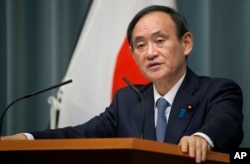South Korean President Moon Jae-in described Japan’s wartime use of “comfort women” as “crimes against humanity” Thursday in some of his strongest comments yet, sparking an immediate protest from his key ally in containing North Korea.
Moon said during a speech marking a national holiday commemorating Korean resistance to Japanese occupation, his first since taking office last year, that Japan was in no position to declare the emotionally charged issue settled.
“As the perpetrator, the Japanese government shouldn’t say ‘it’s over,’” Moon said. “Wartime crimes against humanity can’t be swept under the rug by saying ‘it’s over.’”
His comments drew an immediate rebuke from Tokyo.
A bitter history
Japanese Chief Cabinet Secretary Yoshihide Suga described Moon’s comments as “extremely regrettable.”
Suga, speaking at a regular briefing, also urged cooperation between South Korea and Japan to tackle the threat posed by North Korea’s missile and nuclear programs.
Japan and South Korea share a bitter history that includes Japan’s 1910-45 colonization of the peninsula and the use of “comfort women,” Japan’s euphemism for women, many of them Korean, forced to work in its wartime brothels.
Japan apologized to the women and provided a 1 billion yen ($9.4 million) fund to help them under a 2015 deal with Moon’s conservative predecessor, but South Korea has recently sought to revisit the issue.
“These details were agreed by South Korea and Japan and we find it unacceptable and extremely regrettable,” Suga said.
Moon, speaking at the site of a former jail where Korean independence fighters were imprisoned by Japanese forces, said South Korea was not looking for “special treatment” from Tokyo.
However, he hoped Japan pursued “sincere self-reflection” and “faces justice and the truth of history with a conscience.”
Japan complains
Japan also formally complained Monday after South Korea’s foreign minister raised the issue at the top U.N. rights body, warning that it should not be allowed to harm bilateral relations at a critical time in East Asia.
In February, Japanese Prime Minister Shinzo Abe restated Tokyo’s opposition to revising the 2015 agreement, telling Moon that the deal was a promise between nations and the basis of two-way ties.
Moon said South Korea considered Japan one of its closest neighbors and hoped to be able to move forward together.
“I hope Japan truly reconciles with neighboring countries to which it gave pain, and emerges on the path of peace and prosperity,” he said.






